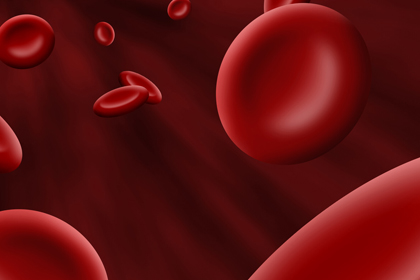The University of Vermont (UVM) is participating in a major national research effort to evaluate the safety and effectiveness of varying types of blood thinners to treat adults diagnosed and hospitalized with COVID-19—the disease caused by SARS-CoV-2.

(Stock photo)
The University of Vermont (UVM) is participating in a major national research effort to evaluate the safety and effectiveness of varying types of blood thinners to treat adults diagnosed and hospitalized with COVID-19—the disease caused by SARS-CoV-2. The National Institutes of Health (NIH) announced the launch of two of three adaptive Phase 3 clinical trials September 10.
Antithrombotics, also known as blood thinners, keep blood proteins or platelets from clumping or sticking to each other, but doctors have not yet determined if, and at what point in the course of COVID-19 infection, blood thinners might be effective at treating patients with this condition. Researchers have noted that many patients who have died from COVID-19 had formed blood clots throughout their bodies, including in their smallest blood vessels. This unusual clotting, one of many life-threatening effects of the disease, has caused multiple health complications, from organ damage to heart attack, pulmonary embolism, and stroke.
Part of the
Accelerating COVID-19 Therapeutic Interventions and Vaccines (ACTIV) initiative, these trials will be conducted at more than 100 sites worldwide and will involve COVID-19 patients who have not been hospitalized, who are currently hospitalized, and who have been discharged after hospitalization for moderate to severe disease. Collectively known as
ACTIV-4 Antithrombotics, the common goal of the three trials is to give doctors critical insights to improve the care of patients with COVID-19 and prevent life-threatening blood clots. All three trials will be coordinated by the NIH’s National Heart, Lung, and Blood Institute (NHLBI) and funded through
Operation Warp Speed (OWS).
“There is currently no standard of care for anticoagulation in hospitalized COVID-19 patients, and there is a desperate need for clinical evidence to guide practice,” said NIH Director Francis S. Collins, M.D., Ph.D. “Conducting trials using multiple existing networks of research sites provides the scale and speed that will get us answers faster.”
UVM's engagement in the ACTIV-4 initiative is three-fold. First, the Laboratory for Clinical Biochemistry Research, led by University Distinguished Professor of Pathology & Laboratory Medicine and Biochemistry Russell Tracy, Ph.D., drafted the biospecimen collection protocols for the three ACTIV-4 trials, and will receive and house all biosamples collected as part of ACTIV-4 protocols. The lab will also serve as the central laboratory for the studies, working closely with the ACTIV-4 Data Coordinating Center at the University of Pittsburgh and ACTIV-4 Mechanistic Studies Center at the University of Michigan.
“We will make ACTIV-4 biosamples available to researchers worldwide to help us better understand how SARS-CoV-2 makes certain people so ill, and how best to treat COVID-19,” said Tracy.
Second is an effort led by Professor of Medicine and Pathology & Laboratory Medicine Mary Cushman, M.D., M.Sc., a lead investigator on the
RAPID COVID COAG anticoagulation trial that will form a key part of the ACTIV-4 Antithrombotics inpatient clinical trial. RAPID has begun recruiting patients in Canada and Brazil and will soon begin in the U.S. as part of ACTIV-4 Antithrombotics. Cushman sits on the NHLBI Collaborating Network of Networks for Evaluating COVID-19 and Therapeutic Strategies (CONNECTS) Steering Committee overseeing COVID-19 human research.
”The speed at which these investigations are being implemented—essentially ‘warp speed’ in terms of the normal research process—is remarkable and a testament to the collaboration of many investigators around the country and our NIH and OWS partners,” said Cushman.
Third, Assistant Professor of Surgery Christos Colovos, M.D., Ph.D., will lead the ACTIV-4 Antithrombotics Inpatient Trial at UVM Medical Center, offering Vermont patients with COVID-19 the opportunity to participate in this research and receive potentially life-saving treatment if Vermont experiences another COVID-19 surge. This trial will investigate the safety and effectiveness of different doses of the blood thinner heparin to prevent clotting events and improve outcomes in hospitalized COVID-19 patients. Additional anticoagulants may be tested, depending on the trial results, and all study participants will continue to receive clinical care as indicated for their condition. UVM will not be participating in the ACTIV-4 Antithrombotics Outpatient trial.
“We must use therapies that support the natural inhibitors of clotting in the blood,” said Keith Hoots, M.D., director of NHLBI’s Division of Blood Disorders and Resources. “Heparin has shown promise, but we really need clinical trial data to determine how much blood thinner, or even antiplatelet medication, to give.”
“The UVM Larner College of Medicine is proud and honored to participate in these critically important clinical trials to address life-threatening thrombosis in COVID-19,” said Dean Richard L. Page, M.D. “Drawing on our faculty’s expertise in hematology, clinical trial design and biospecimen management, these studies have promise for benefit to Vermont, our nation and the entire international community.”
NIH
announced the
ACTIV public-private partnership in April 2020 to develop a coordinated national research response to speed COVID-19 treatment and vaccine options. Managed by the Foundation for the National Institutes of Health, ACTIV brings together multiple partners from government, industry, academia, and non-profit organizations.